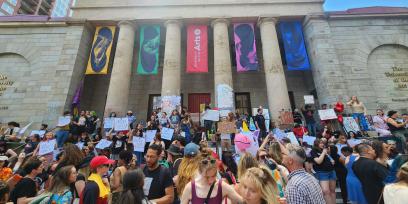Shock. Anger. Grief. These are some of the words faculty, staff and students are using to describe their reaction to the sudden closure of the University of the Arts in Philadelphia, known as UArts.
The people most essential to this beloved Philadelphia institution found out their campus would be shuttered when the Philadelphia Inquirer posted the news on Instagram—just one week before the last day of operations, which was June 7. Administrators never gave any hint of the possibility of closure and didn’t reach out to union leaders, faculty, students or staff until after the announcement had been made by the newspaper.
Official layoff notices didn’t go out until the day of closure. A meeting to address the community was canceled minutes before it was scheduled to begin. The little information shared blames the cataclysmic failure on insurmountable financial woes. Administrators have hired expensive bankruptcy experts to guide them but have still refused to answer questions.
Students, staff and faculty have been rallying, some students even sleeping on the steps of one of the main campus buildings to extend their demonstrations. Students and the faculty and staff union, United Academics of Philadelphia, have filed separate lawsuits, and the union has filed an unfair labor practice charge with the National Labor Relations Board.
“This is such an abrogation of responsibility on the part of the college,” AFT President Randi Weingarten told the Inquirer. “They have broken every norm and every rule imaginable in terms of their obligations to students, staff, to alumni. They have potentially destroyed opportunity and careers for hundreds if not thousands of people. To do it a moment after graduation, this quickly, in the dark of the night—it’s repulsive, it’s obnoxious, and lousy.”
Rallying for answers
Sentiments ran high at a packed rally of some 200 people June 7, the last day of operations, when local elected officials joined students, faculty, staff, alumni and union leaders—including Weingarten—to demand that faculty, staff and students be included in decisions about how to move forward. There are a host of unanswered questions: Will there be jobs for faculty and staff at other local higher education institutions? Will students be able to transfer all their credits and get into those same institutions? How long will employees still have healthcare coverage?
And when, exactly, did the Middle States Commission on Higher Education pull the university’s accreditation? Reports say it was after the closing announcement, so administrators cannot use that as an excuse for closure. Besides which, as Weingarten pointed out at the rally, most entities would do everything within their power to figure out how to regain accreditation—not suddenly shut down.
“The absolute abruptness of this and the lack of communication from the university is unprecedented, even in the context of school closures,” says UAP President Daniel Pieczkolon.
Taking care of the community
Meanwhile, the union is doing all it can to help its members. In addition to demanding impact bargaining, holding rallies and keeping members as informed as possible, UAP’s workshop on unemployment benefits—which it has offered periodically for people, like adjuncts, for whom it is particularly relevant—filled up with about 50 participants, and a series of sessions will continue. A community member volunteered a session on how to get SNAP benefits, also known as food stamps. UAP has written a letter to the board of trustees to establish that its collective bargaining agreement will be valid in the case of a merger or acquisition.
One of the most remarkable things about the closure has been how the community has come together. “All week I’ve gotten to witness faculty, staff and students put into action all of the traits you have learned and nurtured and cultivated in this place,” Pieczkolon told the rally crowd. “Your bottomless creativity, your keen intellect, your fierce compassion, your unwavering resilience. But most of all your profound generosity and care for one another.” Indeed, there were many tears at the rally as faculty took turns recalling how precious this community has become, how rare. Many of them were alumni and had begun their careers decades before.
“We love this community, and we deserve transparency and accountability and justice, and we deserve to immediately begin impact bargaining,” said Pieczkolon.
“What you have created here is majestic,” said Weingarten. “What you have created here is what society needs, and we are going do everything we can to find the fraud, to find out what is going on and to do what we can to make sure that students and the artists and the faculty have the futures that you had a few weeks ago.”
[Virginia Myers]

